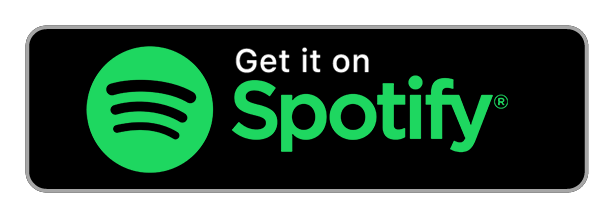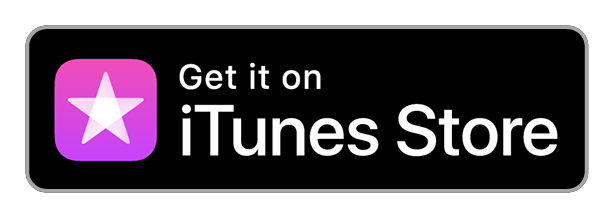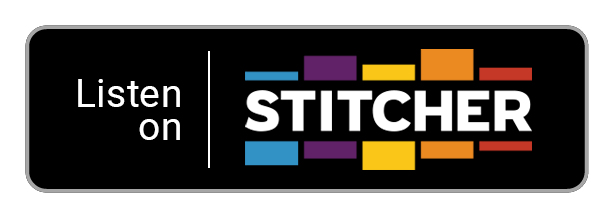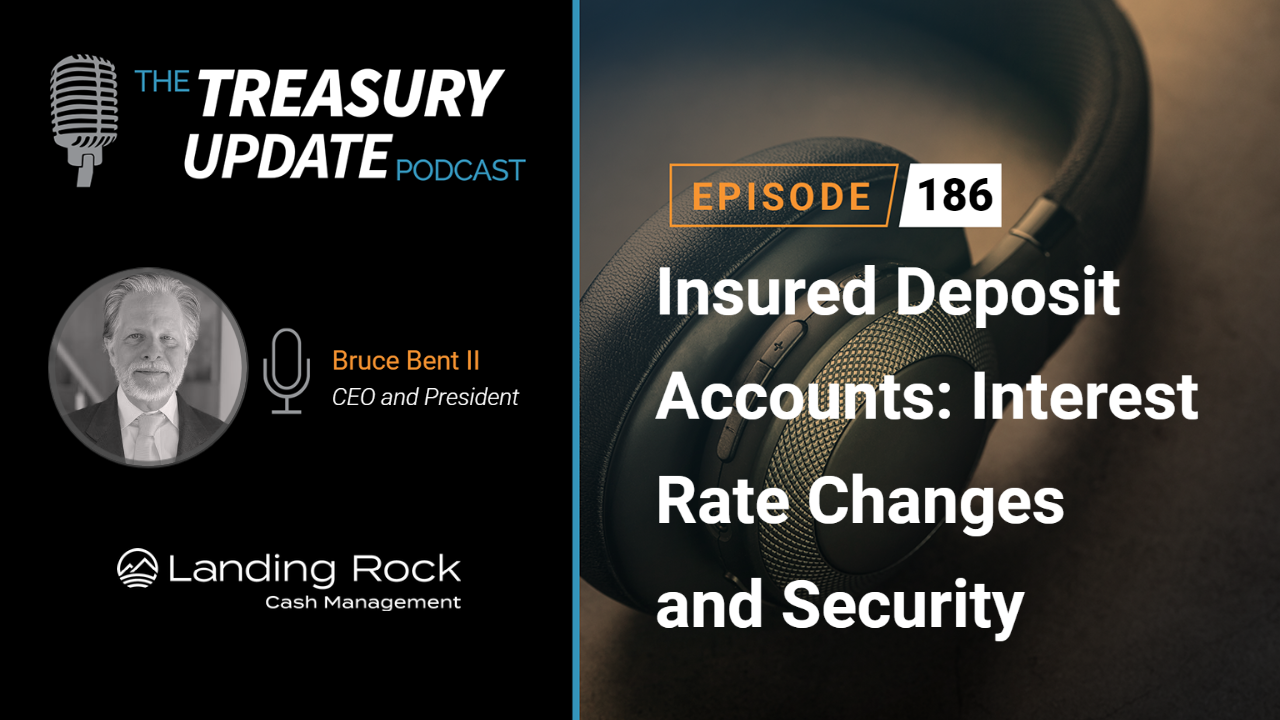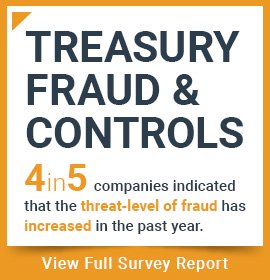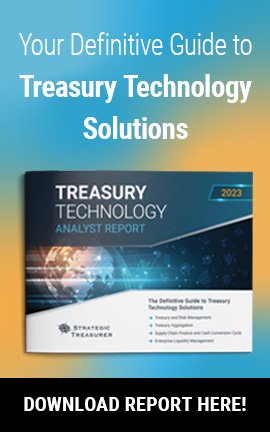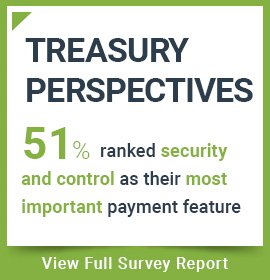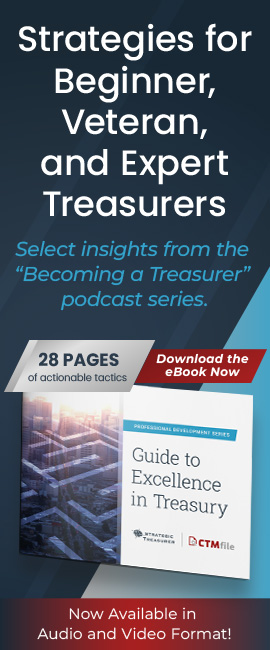
Episode 185
Primer: Insured Deposit Accounts
Host:
Craig Jeffery, Strategic Treasurer


Speaker:
Bruce Bent II, Landing Rock Cash Management
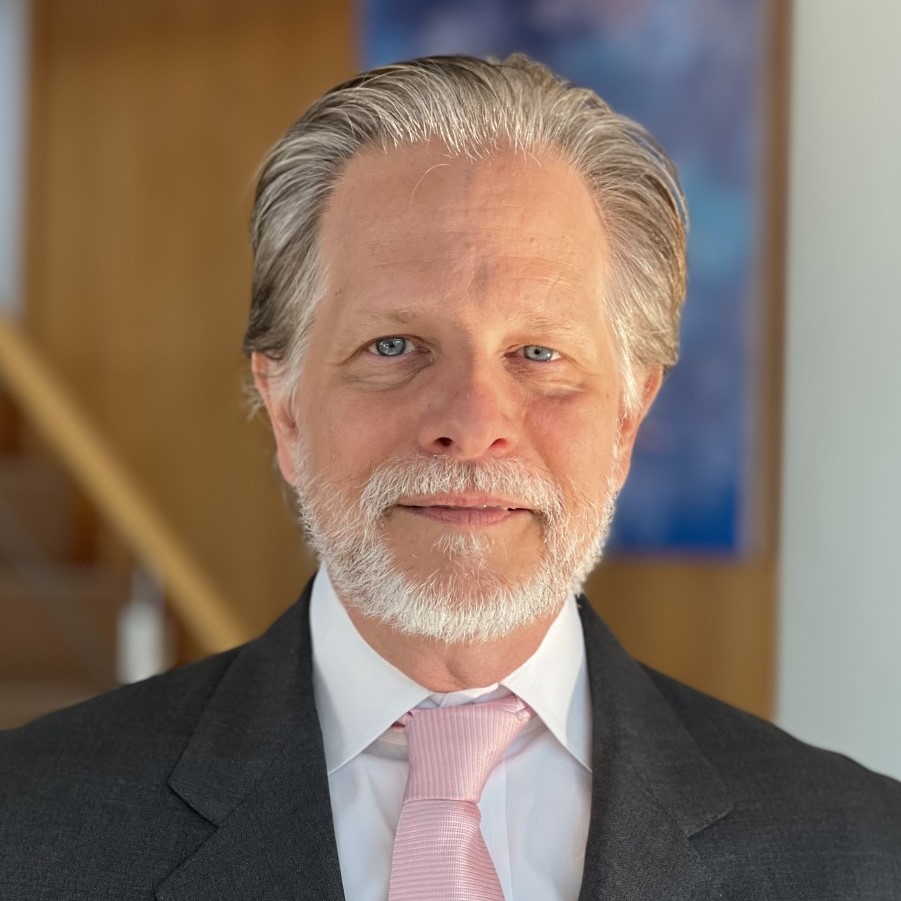

Episode Transcription - Episode 185 - Primer Insured Deposit Accounts
Bruce Bent II 0:04
Welcome to The Treasury Update Podcast presented by Strategic Treasurer, your source for interesting treasury, news, analysis, and insights in your car at the gym, or wherever you decide to tune in. On this episode of the podcast host Craig Jeffery sits down with Bruce Bent II, CEO and President of Landing Rock Cash Management to discuss a primer on insured deposit accounts. They share foundational knowledge around CDs and insured deposit accounts, short term investment options, federally insured cash management accounts, and more. Listen in to this insightful discussion to learn how to position yourself and your company for financial success.
Craig Jeffery 0:54
Welcome to the podcast, Bruce.
Bruce Bent II 0:57
Thanks for having me.
Craig Jeffery 0:58
It’s good to talk about investments and insured deposit accounts. But you know as we begin this discussion, I was wondering if you could give everyone, give our audience, a little bit about your professional background?
Bruce Bent II 1:13
Sure. I’ve been in asset management and financial technologies financial services for about 30 years, a number of different companies, eventually running them, and in particular, have spent a lot of time in cash management and when I say cash management, I mean from an investment perspective. I mean, where you invest cash. I’m in New York I’ve worked out in New York for those 30 years.
Craig Jeffery 1:51
I think in the show notes, we’re going to put some information about your company Landing Rock and so people can follow the link to learn more, but since we are going to be talking about some short-term investment options, your company provides some of those that’s wonder if you could give us just a quick overview on Landing Rock.
Bruce Bent II 2:09
Sure, Landing Rock Cash Management is an affiliate of Double Rock Corporation. Double Rock is a holding company for financial services and financial technologies companies landing rock being one of those and Landing Rock was established as an online cash management provider. It’s highly automated, and it’s focused on a particular category of cash management investments. Which are federally insured cash management product so that’s all Landing Rock does. For example, we do not offer money market mutual funds. We only offer federally insured products.
Craig Jeffery 2:54
Now I want to turn the conversation over into the core of what we want to talk about, which is insured deposit accounts and to some extent, CDs. I was wondering if you could give us some foundational knowledge or a primer on CDs and insurance deposit accounts. What are these vehicles? Where do they play in the investment next, so maybe you could start with what are certificates of deposit or CDs.
Bruce Bent II 3:20
The foundation of this, again, is federally insured cash management products. So, what is federally insured mean? That means if you go to a bank, you see the FDIC logo in the window of the bank. That is the federal insurance that is protecting your deposits at the bank, up to $250,000. And credit unions also have something similar with the National Credit Union Association, same thing. It’s a federal insurance up to $250,000 per account holder or we say per tax ID. So, certificates of deposit are one of those things one of those investment vehicles that offers this federal insurance. Also, a regular deposit account if you have a checking account or a savings account or bank that is also federally insured up to $250,000.
Craig Jeffery 4:27
Why would a company and university and endowment or someone else use and insured deposit account what’s the purpose of that? Either generally, or in comparison with some of the other investment vehicles that exist?
Bruce Bent II 4:41
The way that an insured deposit account from a company like Landing Rock Cash Management works is that we have a few basic goals one is to provide the federal insurance, right, which is the protection, the security. Another is to provide a competitive interest rate. And another is to provide excess federal insurance coverage if it’s needed. So, remember I said the banks and credit unions are limited to $250,000. So, accounts like the Landing Rock insured deposit account links a whole lot of banks and credit unions across the country together and we break up your deposit into $250,000 chunks. So, for example, if you had a million dollars with Landing Rock, we would break that up amongst for banks at $250,000 apiece and therefore you have one account with us. But you have a million dollars of federal insurance coverage. So, one of the reasons that folks open up accounts with us is because they have cash in excess of the $250,000 and they want or are required to have federal insurance cover the entire thing. So, you mentioned public funds or foundations, endowments, public funds, school district, for example, often has or always has investment guidelines, and it often requires them to have their cash fully insured. So, they can either go out if they have that million dollars, they go out and open up four bank accounts on their own and deal with four separate bank accounts. And then they can try and negotiate the best interest rates with each one of those banks and then they can deal with their deposits and withdrawals with those four different accounts. And maybe they can do that with four accounts. But when you get up into 2 million, 5 million, 10 million, 20 million. It’s really inefficient. So, today we’ll come to a company like landing rock and opening up account with us. We manage all those banks, but they only have to deal with one account.
Craig Jeffery 7:12
These are because they’re federally insured federally meaning by like the FDIC, so it is only US dollar based, only offered in the US is that correct?
Bruce Bent II 7:23
From a market perspective some banks will take foreign clients which can benefit from the federal insurance but from Landing Rock’s perspective, we only open accounts for US entities and persons, so we don’t accept foreign accounts and all the investments are in US dollars.
Craig Jeffery 7:43
Okay, so on to insured cash management accounts in some more detail. You mentioned some of the elements there, transaction limits of 250,000 for insurance. I know there was a time where FDIC had bumped it up to unlimited. Now it’s back to a quarter of a million and your comments about, you got 2 million it might require eight accounts. And that becomes inefficient or unwieldy to open up all these accounts. So, I guess as we talk about, you know, the headaches or the challenges of managing short term cash in this regard, when you need insurance coverage, I was wondering if you could talk about these insured cash management accounts from the traditional perspectives of safety, liquidity, and yield, as well as efficiency. I think you started talking about efficiency from you don’t have to open up multiple accounts because there’s vehicles like through your company to invest in multiple banks or have these types of investments spread out, diversified, making sure that coverage, but there’s probably more to the efficiency rather than just opening bank accounts. Maybe you could begin there and then maybe get step through safety, liquidity, yield.
Bruce Bent II 9:00
What you mentioned in terms of risk, right, so risk can be investment risk. That’s where you’re talking about, am I gonna lose money? Am I gonna lose any of my money and that’s where the federal insurance comes in? And why do we make sure that it’s $250,000 per bank, so that we don’t exceed the maximum coverage per bank. In addition, in the Landing Rock insured deposit account, the customer has the ability to deselect banks that they may already have money with. So, they’ll see a list of all the banks that we can put their money, in banks that we have relationships with, and they can say to us, “Oh, you know what, I already have an account at Bank of America or chase or XYZ Community Bank”. Click the box. Don’t send any of my money there, right because if we did, we’d have $250,000 there potentially, and the customer would have something in addition to that, and therefore they’d be over the limit. So, that’s another aspect we’re managing the investment risk, right, using the federal insurance coverage. Another risk that we’re managing, another advantage of this type of account, is we’re managing the liquidity risk. The insured deposit account provides for daily liquidity. If you open up a bank checking or savings account, sure you’re going to have daily liquidity. If you buy a certificate of deposit, if you buy a CD from a bank, you’re not going to have daily liquidity. And sometimes people do that, they’ll buy a CD because they want a better interest rate. So, by going through a company like Landing Rock, they can still often, not always, but often get a better interest rate because we’re buying some of those CDs on their behalf. But where we’re still providing daily liquidity.
Craig Jeffery 9:37
How does the daily liquidity work if someone invests $2 million dollars, it is going into eight different things? I’m assuming it’s going into something like a CD. That the reason is you’re getting the higher interest rate has to do with it is tied up for a longer period of time. How does daily liquidity work for this type of cash management?
Bruce Bent II 11:41
The banks see Landing Rock and companies like Landing Rock as providers of wholesale funding or wholesale deposits. And what that means is, if a bank has a need for deposits, they’ve got a choice they can put up signs in the window selling CDs or offering a high interest rate or savings account if you deposit at least $100,000 and they can sort of let the community bring them their deposits. Now obviously we have an electronic community today as well, so there is some we’re not just talking about brick-and-mortar advertising. There is advertising on the internet or newspapers, whatever else they do. But another choice that banks have is to go to a company like ours and say “Hey, we have a need for 25 million in deposits and we need it in this week. Can you guys provide that?” Companies like landing rock that would be a very efficient, are very efficient providers, of wholesale funding to banks. And in exchange for that efficiency the banks will pay us a higher interest rate than they will the folks that are buying the CDs and opening up deposit accounts because they saw the signs in branch window. That allows us to pass on a higher interest rate, typically, to our customers. And we still have the luxury of daily liquidity because oftentimes, we don’t have to buy a certificate of deposit. The bank won’t ask us to tie up the money with them for three months, six months, 12 months because we’ve brought them that $25 million in a few days as soon as they wanted it. Right? So that’s one of the things that we can command. You can call it buying power, we have more buying power than the individual customers do. That’s not to say we don’t buy CDs, occasionally we do. But we like to be very liquid as well. And so, we don’t do a lot of purchasing of CDs. If we do it, we’re it won’t make up more than five or 10% of our total deposits.
Craig Jeffery 14:01
Okay, so we’ve covered much of safety, quite a bit of liquidity, you talked about yield and interest rates and how you can get rates that might be you know, at or above market, if you could talk about the yield and how that how that works, maybe comparing it to things like money market funds, which also have daily liquidity. How are these compared?
Bruce Bent II 14:25
There’s a lot there. The short answer is that the interest rate on insured deposits accounts like ours fluctuates just like money market mutual fund yields fluctuate and they’re usually pretty close to one other one another except when you get to the terms of interest rate cycles, right? So, when you when you reach the bottom of an interest rate cycle, which hopefully we’re at now.
Craig Jeffery 15:01
I think the Fed is indicating that we probably are close.
Bruce Bent II 15:04
Right. They’re talking about that. So, if interest rates are going to start coming up after having gone down for two or three years now or whatever it’s been, then you might see more of a disparity in rates, the interest rate on deposit accounts versus money market funds. And then the same thing, when you reach the top of the cycle and interest rates have peaked and they’re starting to come down you might see more of a disparity, but in general they’re pretty close. However, the market for money market instruments is still more efficient than the market towards deposits. So, if you’re buying treasury bills, and you’re running them on my own, investing your money funds in the money funds, you’re buying treasury bills, and things like that. They’re not going to find a lot of anomalies. They’re not going to find some investment that’s paying at a rate that’s way above market. However, when you’re talking about the market for deposits, you’re looking at banks nationwide, where some of the bank’s customers are net borrowers and therefore, they need more deposits and other banks customers are net depositors and they don’t have a need for deposits. So, companies like Landing Rock can find these anomalies in the market for deposits, and sometimes really find some nice interest rates that are significantly above market and pass some of that on to the customer.
Craig Jeffery 15:28
Anything else on the efficiency side? I guess I’m going to ask this question, partly because I had a misunderstanding of how these cash management accounts work. I guess I had seen them as a consolidated way of investing in CDs without having to go to 20 or 30 banks. If you had a lot of money to put away and just buy all the different CDs. But what you’re saying is there’s… it’s not just savings about the account opening. It’s the whole distribution report. Maybe you’re not saying that, but that seems to be the case. I think the value on the efficiency side is a little cleaner there. Is there anything else on the efficiency side that is worth noting for corporate investors and short-term funds?
Bruce Bent II 17:41
Some of the other efficiencies of an insured deposit account that consolidates multiple banks into one account is the ability to enter transactions in online so you can end go into the account, click a button, transfer money in or out. You can link outside banks or brokerage accounts to that one account. If you have other folks, for institutions in particular, there’s a need for reports, there’s a need to share statements, there’s a need to share access to the accounts. There’s also sometimes a need to have different types of access that some folks are on the corporate resolution and are qualified end transactions. Some folks need city information, but they’re not qualified to enter transactions. So, all those little things which are important, are also part of these types of accounts typically.
Craig Jeffery 18:49
Yeah, excellent. So, Bruce, I think this has been a really good primer on the cash management accounts and some of the distinctions between them and CDs by themselves, as well as some of the similarities and differences with institutional money market fund accounts. I look forward to our next conversation. We’ll get into some additional details on insured cash management accounts.
Bruce Bent II 19:15
Great, thank you very much for having me. Appreciate it.
OUTRO 19:21
You’ve reached the end of another episode of The Treasury Update podcast. Be sure to follow Strategic Treasurer on LinkedIn, just search for Strategic Treasurer. This podcast is provided for informational purposes only, and statements made by Strategic Treasurer LLC on this podcast, are not intended as legal, business, consulting, or tax advice. For more information, visit and bookmark strategictreasurer.com.
Related Resources
#TreasuryFAQ – YouTube Playlist
Check out our YouTube playlist covering many frequently asked questions in treasury!
Insured Deposit Accounts: Interest Rate Changes and Security
Host Craig Jeffery continues a conversation with Bruce Bent II, CEO and President of Landing Rock Cash Management, on insured deposit accounts with a focus on interest rate changes and security. They explore the differences between holding a certificate of deposit (CD) and having an individual deposit account, how to navigate investment decisions between products, and what you must consider with short-term investment on security and compliance.

